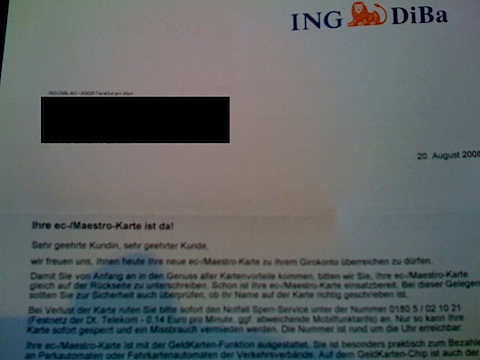Connecting to the Globalsat GH-615M GPS Watch in Ruby
If you happen to own a Globalsat GH-615M GPS Sports watch and want to connect to it using the serial interface and ruby, you might want to look at two things:
Here's a short sample of how to do it in ruby (more op-codes are in the "gh615"; python app)
#require the ruby-serialport library
#fixes a crash when doing a "require rubygems"
#use instead of require "serialport"
Kernel::require "serialport"
#connecting to the usb adapter and returning the port object
def connect
port = SerialPort.new("/dev/tty.usbserial")
# configure the serial port
port.baud = 57600
port.read_timeout = 2
return port
end
#will return model information
def whoami(port)
#a curtesy sleep
sleep 2
##########SENDING
#the code will be converted to decimal and then to the matching character
#each of the resulting characters will be put into the serial connection
'020001BFBE'.scan(/../).each{|tuple|
port.putc tuple.hex.chr
}
#a curtesy sleep
sleep 2
##########RECEIVING
answer=""
#getting integers until "nil" is returned...
#integers are converted to their matching ASCII characters and returned as a string
while (1)
character = port.getc
if character.nil?
break
else
answer+=character.chr
end
end
#removing the header
if answer[3..9].nil?
return "No Answer"
else
return answer[3..9]
end
end
puts "Connecting"
myport = connect()
puts "Asking for model-information:"
puts "Answer: " + whoami(myport)
myport.close
sleep 2
Apple Special Event
Apple will hold one of its famed “special events” on September 9 at 10:00 a.m in the Yerba Buena Center for the Arts Theater in San Francisco. The company is expected to make several new product introductions at the event, potentially including new iPods.
McCain/Palin 08
Also known as: the cast from "Battlestar Galactica";

2. Damn, the internet is fast: http://www.vpilf.com/
3. Wow, somehow the Palin Pleased with Obama's Energy Plan page only shows up in the google cache, but not on the real page anymore
Invites, Invites, Invites!
Thanks to Florian Jensen I got my hands on some invites and thought it would be a nice idea to share some myself, simply comment with your correct email and you shall receive:
- Jaiku <- a google powered twitter! (unlimited invites)
- Ping.fm <- allows you to update a BIG bunch of web 2.0 thingies (twitter, jaiku, identi.ca, brightkite , …) with a simple jabber post or using the webinterface. Try them all :)
- boxee <- a social media center for OSX + Ubuntu (Windows support is planned) based on XBMC, alpha atm
Can't remember anything else I use atm, but I'm sure I've got some invites to other services left… I'll think about that one ;)
Dear German TV Producers: I Hate You!
First of all: I do not only hate german TV producers, I hate all of them separate but equal! (maybe I do have a little bit of extra hate for the german ones, read on)
Ok, now the main post:
I usually don't watch german TV besides documentaries. While the actual synchronization of all the US TV stuff is actually pretty ok ty compared to every other country on earth, the translations usually suck and a lot of the jokes get lost in translation :-(
The worst thing is how INCREDIBLY unimaginative those fuckers are! I get why it is not the worst possible thing to synchronize successful US TV shows, apparantly some people don't understand spoken english (or written for that matter) and they've gotta reach a certain number of people.
But what REALLY is a bad idea: taking an idea 1:1 and simply replace everybody with a (most of the time: bad) german actor.
There are some series which simply take the concept and create a good plot on their own.
An example :
Hybrid User Provider - Now in Main Openfire Release
Thanks for Telling Me Anyway...
![]()
WTF?! That sounds like "I've got a feeling something is wrong…";
Review: Cheap Ass Iphone Headset
I decided that a person can never have enough headsets for their portable mp3 player (read: iphone) because the chance of losing a pair is approximately 7000%
As apple charges approximately infinite Euros for a simple headset, I decided to look though ebay for something cheaper, it's basically a 3,5" plug with a bit of plastic removed anyway, I'm sure China can deal with that :)
I spend a whooping 6,29 Euros on iphone headsets from "hellogift"; and a week later I find this in my mailbox:
They look like the original
They sound like the original
They have the same "push the thingy to accept calls, push twice to switch tracks"; functionality
—> awesome
Isn't It Ironic...
Two letters arrive at once:
1. my old bank:

2. my new bank:

SICP - Structure and Interpretation of Computer Programs
UPDATE: removed the downloads... way to little traffic
You love the 80s? You love minimal syntax programming languages? I guess it’s your lucky day!
"Structure and Interpretation of Computer Programs has been MIT’s introductory pre-professional computer science subject since 1981. It emphasizes the role of computer languages as vehicles for expressing knowledge and it presents basic principles of abstraction and modularity, together with essential techniques for designing and implementing computer languages.\"
 |
These video lectures are copyright by Hal Abelson and Gerald Jay Sussman. They are licensed under a Creative Commons License. |
from the original site you can get VCD files (1400 mb / lecture) or divx files (same resolution as the vcds, probably a reencode, 500 mb / lecture)
Thanks to the license, it was possible to noise-filter and reencode the big vcd files to h.264 + aac at approx 250 mb / lecture.
You basically won’t use lisp to do anything in real life (yeah… there are some people…), but it teaches you the important concepts of basically any programming language.
Thanks to my hosting provider which provides 5 tb of monthly traffic and 500 gb storage space, I decided to share:
Lecture 1a: Overview and Introduction to Lisp (1:13)
Lecture 1b: Procedures and Processes; Substitution Model (0:58)
Lecture 2a: Higher-order Procedures (1:01)
Lecture 2b: Compound Data (1:17)
Lecture 3a: Henderson Escher Example (1:16)
Lecture 3b: Symbolic Differentiation; Quotation (0:44)
Lecture 4a: Pattern Matching and Rule-based Substitution (1:03)
Lecture 4b: Generic Operators (1:23)
Lecture 5a: Assignment, State, and Side-effects (1:15)
Lecture 5b: Computational Objects (1:05)
Lecture 6a: Streams, Part 1 (1:07)
Lecture 6b: Streams, Part 2 (1:03)
Lecture 7a: Metacircular Evaluator, Part 1 (1:25)
Lecture 7b: Metacircular Evaluator, Part 2 (1:00)
Lecture 8a: Logic Programming, Part 1 (0:42)
Lecture 8b: Logic Programming, Part 2 (1:08)
Lecture 9a: Register Machines (1:12)
Lecture 9b: Explicit-control Evaluator (1:11)
Lecture 10a: Compilation (0:46)
Lecture 10b: Storage Allocation and Garbage Collection (0:59)
Have fun :)




